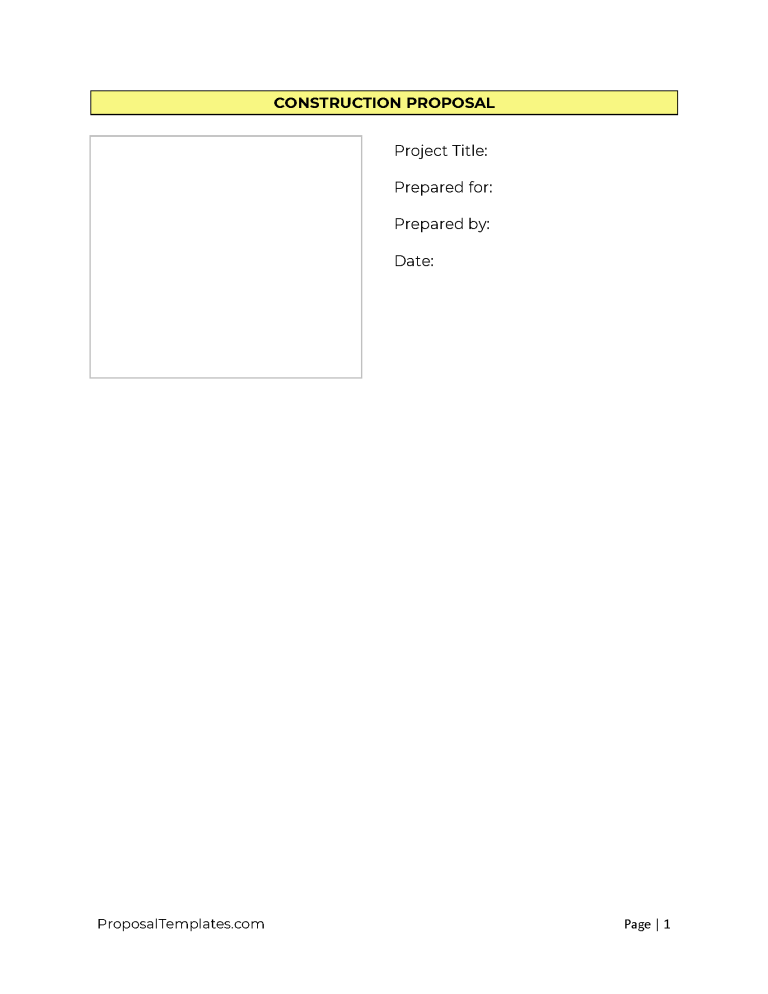A construction proposal is a document used by construction companies, contractors, and managers to define a construction project as well as determine its pricing. It should include the structural changes needed for the property and the best available solutions in order to place a bid. The proposal should put forth the best reasons the client should consider the contractor, such as how long they’ve been in the trade and other projects they have completed.
Types of Construction Proposals (15)
What Should be Included (7 Items) |
1. Cover Letter
The introduction paragraph should include the contractor’s qualifications, such as their tenure in the business and recent projects completed. This section acts as a brief resumé on their background while discussing why the contractor or construction company is the best choice for the job.
- Proposal Title, Proposal Date
- Construction Company (Or Contractor) Name
- Potential Client Name, Contact
- Company, Website, Contact Information
- Project Bid, Project Location, Call To Action
2. Project Goals
The construction projects must be listed while also aligning with the company or contractor’s mission. Also, deliver an assessment in relation to the site conditions and the project’s requirements.
- Objectives, Goal-Oriented Construction, Post-Project Support
- Clear project Scope, Client-Focused Approach, Equipment
- Communication, Quality Assurance, Construction Solutions
- Timely project Completion, On-time delivery, Opportunities
- Budget, Cost Management, Building Code Compliance
3. Project Details
The project description includes the client’s goals and objectives as well as details on the site conditions. If any special procedures are required, such as obtaining local government permits, they should be mentioned.
- Location, Site Condition, Objectives, Management, OSHA Compliance
- Energy Efficiency, Quality Control, LEED Certification, Risk Management
- Site development, Renovation, Remodeling, Building Codes
- Infrastructure, Value Engineering, Construction Methods
- Cost-Effective Solutions, Sustainable Materials, Energy Efficiency
4. Scope of Work
This section dispenses the construction project’s work, schedule, and budget in detail. This area should be all-inclusive to discussing the construction project’s requirements and thus include will include the materials needed, labor costs, completion dates, and the total cost.
- Construction Services, Task List, Customization, Budgeting
- Permit Acquisition, Project Scheduling, Site Safety Measures
- Quality Control, Cost-Effective Construction, Structural Framing
- Interior Finishing, HVAC Installation, Green Building Construction
- Renovations, Building Code Compliance, Sustainability
5. Schedule
Include the construction project’s schedule or timeline since this determines the project’s start date, end date, phase dates, and duration. Match each deadline with project goals, its scope, and payment plan options accordingly.
- Project Timeline, Deadline Management, Construction Planning
- Efficient Scheduling, Task Scheduling, Milestone Scheduling
- Task Coordination, Billing Schedule, Construction Calendar
- Project Duration, Project Phases, Milestone Tracking
- Monitoring, Reporting, Schedule Adherence, Administrative Deadlines
6. Construction Project Budget
It is important that the client can easily assess the cost of the project, thus include a section on the project’s budgeting and costs. In addition to displaying the total estimated costs and a breakdown of its line items, this report should be upfront and transparent.
- Construction Budget, Project Cost Estimation
- Financial Transparency, Accurate Cost Assessment
- Transparent pricing, Competitive Pricing, Cost Tracking
- Budget Management, Cost Control, Cost Containment
- Detailed Cost Breakdown, Budget Analysis, Cost Structure
7. Payment Terms
The payment terms include the total amount owed by the client and when payments are due. Generally, partial payments are made in construction projects when goals have been met until the completion date.
- Payment Terms, Payment Schedule, Tracking
- Billing Arrangements, Payment Milestones, Flexibility
- Payment Structure, Payment Installments, Invoice Details
- Invoice Terms, Financial Terms, Billing Schedule
- Payment Due Dates, Contract Payment Terms, Milestone Payments

